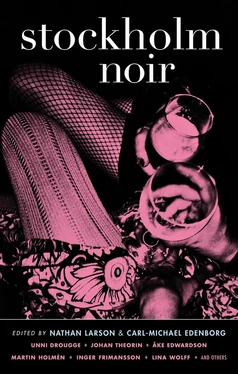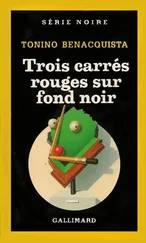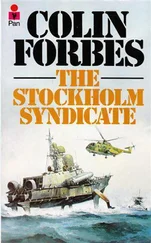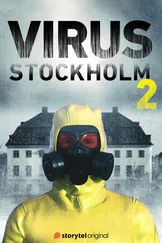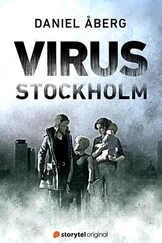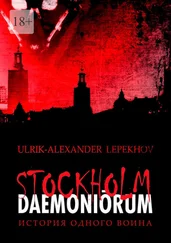Caroline Åberg - Stockholm Noir
Здесь есть возможность читать онлайн «Caroline Åberg - Stockholm Noir» весь текст электронной книги совершенно бесплатно (целиком полную версию без сокращений). В некоторых случаях можно слушать аудио, скачать через торрент в формате fb2 и присутствует краткое содержание. Город: New York, Год выпуска: 2016, ISBN: 2016, Издательство: Akashic Books, Жанр: Детектив, на английском языке. Описание произведения, (предисловие) а так же отзывы посетителей доступны на портале библиотеки ЛибКат.
- Название:Stockholm Noir
- Автор:
- Издательство:Akashic Books
- Жанр:
- Год:2016
- Город:New York
- ISBN:978-1-61775-297-1
- Рейтинг книги:3 / 5. Голосов: 1
-
Избранное:Добавить в избранное
- Отзывы:
-
Ваша оценка:
- 60
- 1
- 2
- 3
- 4
- 5
Stockholm Noir: краткое содержание, описание и аннотация
Предлагаем к чтению аннотацию, описание, краткое содержание или предисловие (зависит от того, что написал сам автор книги «Stockholm Noir»). Если вы не нашли необходимую информацию о книге — напишите в комментариях, мы постараемся отыскать её.
Copenhagen Noir
Helsinki Noir
Stockholm Noir — читать онлайн бесплатно полную книгу (весь текст) целиком
Ниже представлен текст книги, разбитый по страницам. Система сохранения места последней прочитанной страницы, позволяет с удобством читать онлайн бесплатно книгу «Stockholm Noir», без необходимости каждый раз заново искать на чём Вы остановились. Поставьте закладку, и сможете в любой момент перейти на страницу, на которой закончили чтение.
Интервал:
Закладка:
I avoid turning on the light, I don’t want anyone to see that there’s someone behind the dusty old cellar windows. I take out my penlight and turn it on. The beam slides over the interior of the room. In the middle there is a slaughtering block with legs of steel and a thick oak top. In the ceiling there are hooks. The once white tile floor is covered in black gore. It stinks. I gag a couple of times before I walk on in.
I reach the table. There is a big scale on top of it. Alongside the longer wall there are a few refrigerators and freezers. I start walking toward them.
Suddenly there’s a sound, a scraping as if someone is sneaking around. Between the rows of refrigerators and freezers there’s a doorway. I squint and glimpse someone coming toward me. I can’t make out any details, but it is a person without a doubt, and I’m sure it’s carrying a large butcher knife. I raise my gun and point it at the person’s legs. I’m trembling. The figure keeps bobbing and swaying before my eyes.
— Stop. I’ll shoot. Lower your weapon.
The person keeps walking toward me. It raises the hand carrying the knife. I am sweating so heavily I can hardly see, the stinging salty drops gather in my eyes. I put my finger on the trigger.
— One more step and I’ll shoot.
The person keeps walking and I fire. It bangs like hell. My ears are ringing. It’s the first time ever I’ve fired my gun on duty and it feels good, real good. I want to do it again.
I take a few more steps toward the doorway but so does the other one. I shoot again, this time I’m aiming for the stomach. The figure keeps heading my way. I fire three more shots before I lower my gun. I wait; I can smell the gunpowder, mixed with blood. It’s completely silent except the ringing in my ears.
I shine my flashlight but the beam finds no body on the floor. I take a few steps toward the doorway and realize there is no doorway.
It’s the chromate freezer. There are five black holes in the steel. My face is there too; my eyes don’t look so well. I yank the door open.
Peter stares back at me. It’s been a long time since I’ve seen my son. Now I’ve found him all right. One of the bullets has gone through and entered his forehead. But there is no blood. His detached head had been emptied of blood long ago.
— I had to, I tell him.
He laughs. I laugh too.
— That’s what happens to snitches — you know it and I know it, dear son. You said I was a bad mother and you were going to set me up. Even though I said I was sorry.
I smile and shove my gun back into the holster before I walk over to the other side of the room. I take my coat off and put on the big plastic apron. I plug in the sabre saw and test-drive it for a while. The ten-centimeter blade glides speedily back and forth.
I’m just about to put it on the slaughtering block and get the last few pieces of my son when the door is bashed in, a sharp light fills the room, and someone shouts, I’m sure I recognize the voice, it’s the bitch with the ponytail:
— Agneta, you’re surrounded. Drop your weapon. Don’t worry, it’s all going to be fine. Just drop your weapon!
I turn toward the cops. Their lights are so bright I can’t see them, but I’m guessing there are a bunch of them making their way into the room, my sanctuary.
— Agneta, listen, take it easy now. Put your weapon down and we can talk about it.
— This isn’t a weapon.
— I can see that you’re carrying a weapon, Agneta. Now put it on the table slowly and we can talk later.
— This isn’t a weapon. This is my Savior.
I push the button again and start the saw. I lift my arm in a smooth arc and push the saw into my own throat. Dying doesn’t hurt. I get down on my knees, as if I’m praying, with blood whirling over my head like a halo.
Death Star
by Unni Drougge
Translated by Rika Lesser
Hammarbyhamnen
Back then, gentrification hadn’t yet managed to destroy the aggregate of small-scale industries, warehouses, workshops, hovels, and shacks which characterized the area along the polluted Hammarby Canal. Nonetheless, a doomsday atmosphere pervaded the district, partly because the city was ready to level it to the ground, partly because executions regularly took place there. It was easy to dump bodies in the algae-green stream.
It wasn’t the thought of bloated corpses amidst scrap iron and timber down at the swampy bottom that lured Berit Hård to take her daily walk along the water at dusk. Rather, it was a diffuse yet deep sense of solidarity with South Hammarby Harbor’s maladjusted elements. She found a certain beauty in this dilapidated marginal area that was teeming with life, where rats scurried through chemical spills, where she had to zigzag between mossy stacks of boards and rust-eaten machine parts, where filthy old men sat under moldy tarps and burned garbage, over which they would warm themselves or grill sausages.
The smoke didn’t bother Berit; she was a smoker too and could easily find black-market cigarettes in the stalls near the approach to the main road. She could even get cheap bootleg liquor there.
Her great love for these doomed surroundings, despite everything, had roots in a love of a more carnal sort: Rafel. The first time she’d seen him standing and welding sheet metal in a building that resembled a hangar, where the canal widened into a pool, her heart skipped a beat. When he took off the mask, his intense gaze hit her like sparks from the welding gun. Every late afternoon when Berit found her way to this place, she relished the opportunity to look into the mystical depth of Rafel’s eyes.
She moved constantly in the daydream called “hope for the future,” for she was only twenty years old and had seen more life than death.
But that evening in October, Hammarby Harbor’s silhouettes rose up above the fog banks like ghastly skeletons. Or maybe this was only how she remembered things afterward. For this was when she saw a young person lose her life.
She’d witnessed this from a distance just as she was nearing a decommissioned lightbulb factory. The building’s functional architecture appeared like a cluster of wooden blocks, one of which stood on its end, crowned with something that resembled a glass booth on columns. As Berit examines the smashed windowpanes, a body came floating down from a high ledge and disappeared behind a clump of trees. Berit expected to hear something when the body hit the ground, but there wasn’t a sound. She rushed up the grassy embankment, layers of thick fog drifting in front of her as she desperately searched for the body. The mangled form on the ground wasn’t visible until she reached the building.
A slender girl with dark hair, scarcely older than eighteen, lay racked on a big chunk of concrete with protruding iron rods. Her eyes, framed with kohl, were open and her lips, painted black, vaguely stirred. Berit walked toward her and bent down over her body.
— Cos... the girl panted. Cos... mo...
— Cosmos? Berit repeated, as a nasty rattle came from the girl’s throat and she went silent.
The girl’s pulse faded away under Berit’s thumb. Berit set off for the road just behind the factory. After staggering breathlessly for a few seconds, she pulled up her tight skirt above her hips, and once she reached the road, she tried to flag down the first oncoming car. When it emerged from the fog and slowed down, Rafel sat behind the steering wheel in a small olive-green Renault with a disproportionately big rear end he’d built himself, presumably to make room for all the junk he liked to tinker with. Rafel stopped the car and asked Berit what happened. She told him what she’d just witnessed.
— Is she alive? Rafel asked in his deep bass while Berit plunked down into the seat beside him.
Читать дальшеИнтервал:
Закладка:
Похожие книги на «Stockholm Noir»
Представляем Вашему вниманию похожие книги на «Stockholm Noir» списком для выбора. Мы отобрали схожую по названию и смыслу литературу в надежде предоставить читателям больше вариантов отыскать новые, интересные, ещё непрочитанные произведения.
Обсуждение, отзывы о книге «Stockholm Noir» и просто собственные мнения читателей. Оставьте ваши комментарии, напишите, что Вы думаете о произведении, его смысле или главных героях. Укажите что конкретно понравилось, а что нет, и почему Вы так считаете.
